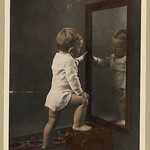
Baby In Mirror
I have not posted in awhile, but have not lost sight of my intention to explore the mystery of how to find love in our lives. I’m offering a way that we can each create an individualized roadmap in order to embark on this life altering journey. I will be breaking down the journey in a series of blogs. This one is about looking carefully at where we are right now in terms of feeling we are “fully seen” by important people in our lives…including ourselves. I believe this is the first step toward the ultimate goal of wholeheartedly giving and receiving love.
My long hiatus from writing blogs has come about because of two recent experiences in my life. In the “living” of these experiences I have learned something that I only knew intellectually before. My “embodied” learning is the following: I don’t believe that any of us humans can fully give and receive love unless we have had the experience of being fully seen, heard, and understood by meaningful people in our lives. . My first experience was attending the “Burning Man” festival in the Black Rock desert of Nevada. The second experience was attending a 2-day couples therapy workshop where I learned something of the principles and practice of Imago couples therapy.
Burning Man
The Burning Man experience is difficult to explain in a few sentences, but for the purposes of this blog, the feature I want to concentrate on is a Burning Man main principle. It is the principle of “Radical Inclusion”…. which basically means you are encouraged to show up at the event in whatever way best expresses your true and most authentic self. Of course, in such an environment people are going to dress, or not dress, in very extreme ways…but this is exactly the point. What I found at Burning Man was that I got to “play” with as many versions of myself as I wanted…and everything was accepted and celebrated. This might sound like a really fun costume party…but actually it was a whole lot more. Much more important was the “heady” feeling I got that people really saw and appreciated me. I felt like I was about 3 years old on the jungle gym…saying, “Look at me!!!” At the same time, of course, I was looking at everyone else and appreciating the way they were presenting themselves. The best way to sum up the experience is that a true feeling of love and acceptance permeated through my body and soul at Burning Man. It was a feeling of love for everything and everybody, and I promise you that no drugs were involved. Wonder why “Burners” go back to Burning Man year after year? This is a big part of why. We don’t get this experience in life on a daily basis. More’s the pity. I think we really need it.
Imago Couples Therapy
It was excellent timing for me to attend the Imago Couples therapy workshop right after Burning Man. In this training I learned the importance of “mirroring” for the quality of couples communication …that is the importance of being able to feed back to a person that you have really heard and understood them. This is not unlike the experience of mother and baby. When a young baby is held in his/her caregiver’s arms, the caregiver ideally “mirrors” back to the infant that this infant is seen, heard, and loved. The “mirroring” is done through the “baby talk” of the adult who is responding minute to minute to the baby’s vocalizations…maybe even imitating them. This is the basis of attachment. This is the basis of love. More fundamentally, the “mirroring” experience in early infancy is what gives the baby the experience of actually existing. (kind of a I am mirrored, therefore I am) When an infant experiences the facial expressions and “attunement” of a caregiver, this infant feels love. And the love feeds back to the caregiver who loves back in equal measure
The Couple Is Just Like Mother/Father and baby
Attachment in a couple is actually exactly like mother/father and baby attachment. Through the repetitive “mirroring” exercises of imago therapy, each member of the couple practices hearing and repeating back exactly what they heard from the other half of the couple. The result is pretty amazing, as each member of the couple understands, maybe for the very first time, what it is like to stand in the shoes of his partner without judgment and assumption. Love can begin to flow freely again from a place of truly understanding who that person before you actually is.
What These Experiences Can Teach About The Importance Of Feeling Seen
After the experience of Burning Man and now having tried leading couples through mirroring exercises, I’m convinced that we must each find ways to bring the people and experiences into our life who allow us to feel fully seen, understood, and appreciated. These days I’m not willing to spend much time with people when this is not the case…Life is too short and I know for a fact that love can only emerge, thrive, and grow when enough of your environment “mirrors” back to you your full, flawed, and ultimately imperfect self.
 It’s Thanksgiving season. What better time could there be to take a look at the concept of Gratitude in our everyday lives? Should we not feel gratitude at other times of the year as well?
It’s Thanksgiving season. What better time could there be to take a look at the concept of Gratitude in our everyday lives? Should we not feel gratitude at other times of the year as well?







